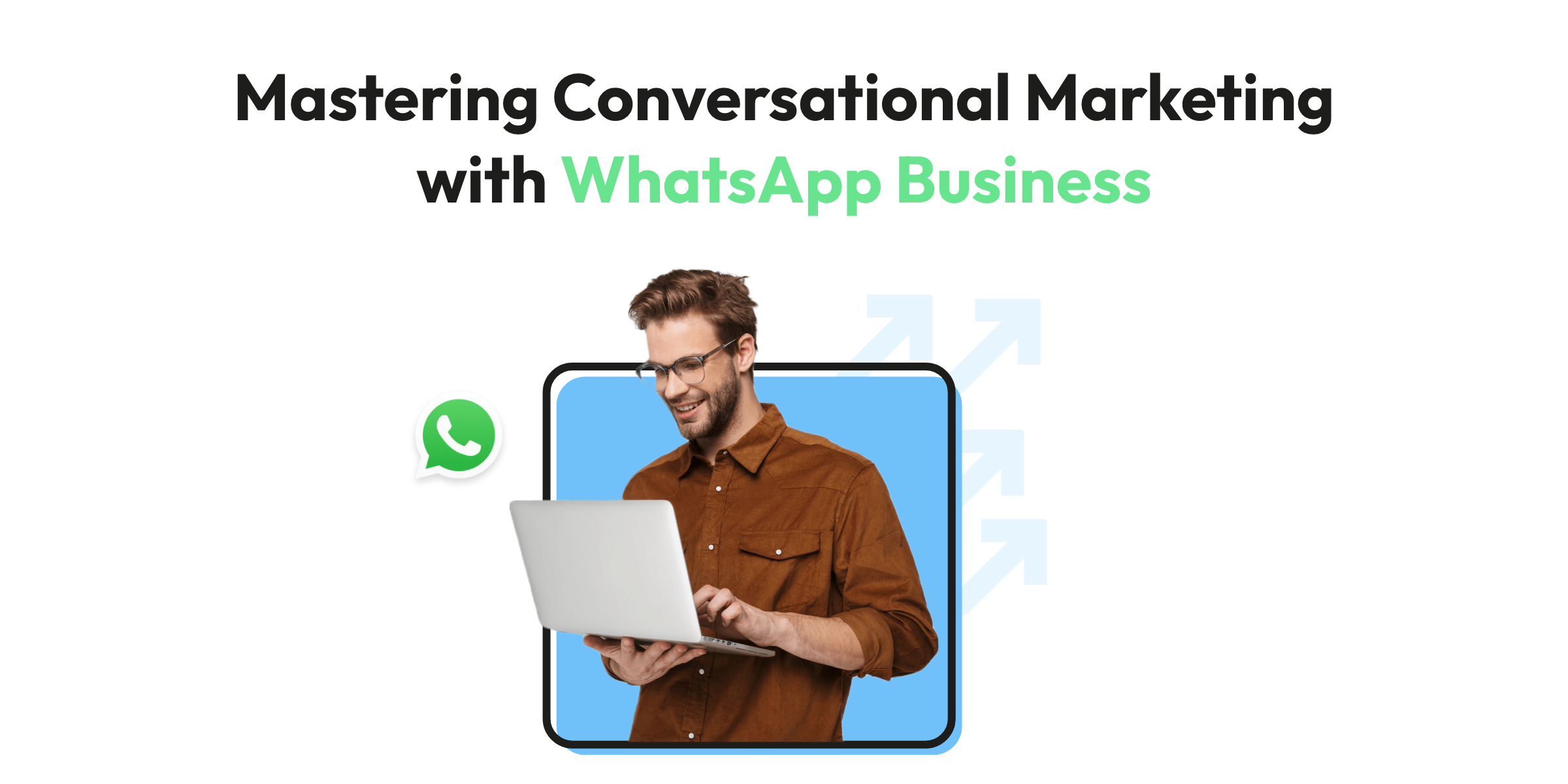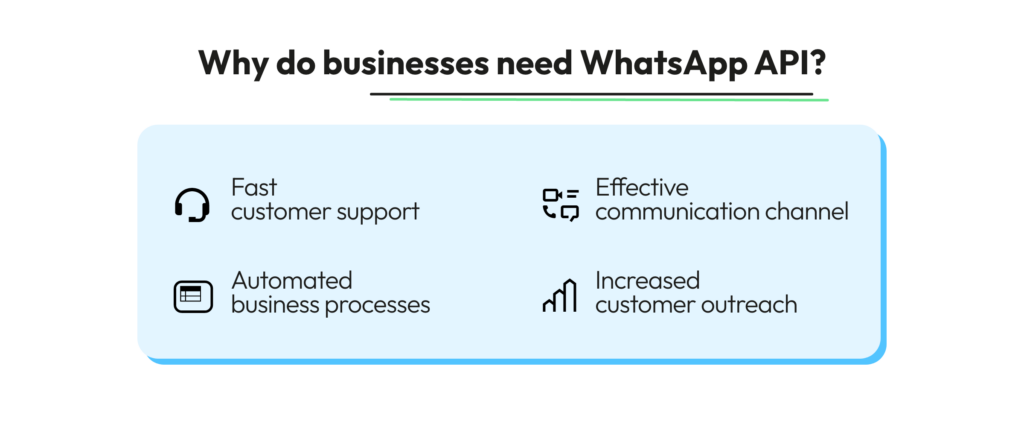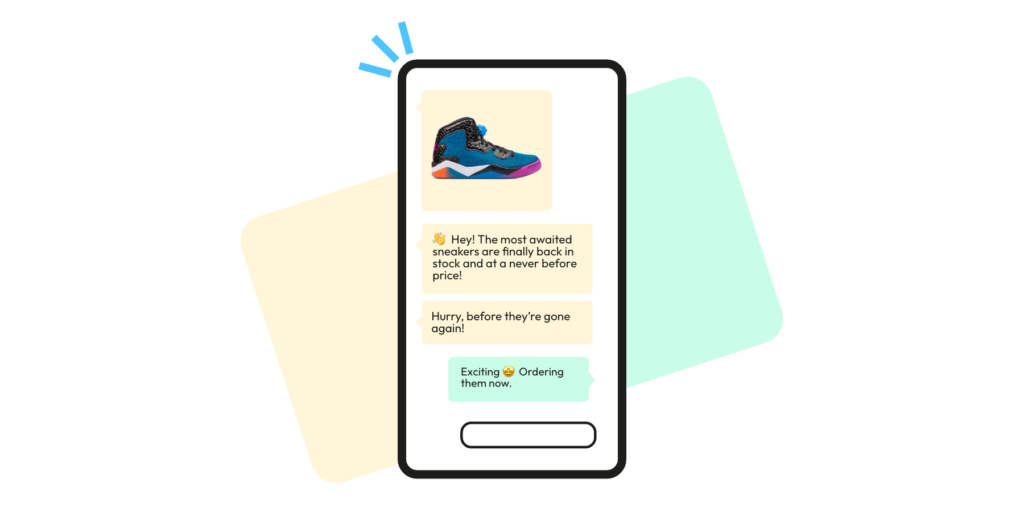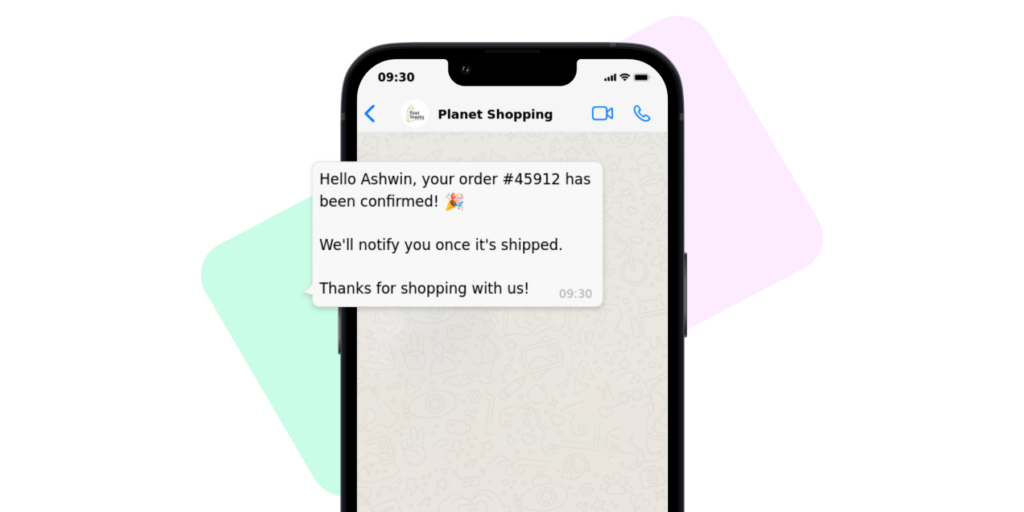-
-
FeaturesคุณสมบัติPenyelesaianRecursosFiturCaracterísticas精选功能精選功能المزايا
-
Solutionsโซลูชั่นPenyelesaianSoluçõesSolusiSoluciones解决方案解決方案الحلول
-
IntegrationsการผสานรวมIntegrasiIntegraçõesIntegrationsIntegraciones集成平台整合دمج مع تطبيقات أخرى
-
Affiliate/Partnersพันธมิตร/พันธมิตรทรัพยากรAfiliasi/Rakan KongsiAfiliados/ParceirosAfiliasi/MitraAfiliados/Partners联盟/合作伙伴聯盟/夥伴شريك
-
ResourcesจองการสาธิตSumberRecursosSumber dayaRecursosالموارد

Mastering Conversational Marketing with WhatsApp Business
In an age where immediacy is not just appreciated but expected, Conversational Marketing with WhatsApp Business has emerged as a linchpin strategy for businesses looking to connect with their audience on a more personal level.
Conversational marketing is not just about talking to your customers; it’s about talking with them. It’s the art of using real-time, one-to-one connections to build trust and discover customer needs. By focusing on the customer’s journey through dialogue, businesses can tailor experiences, offer solutions, and create a seamless buying process.
The meteoric rise of messaging apps has revolutionized business communication. In the past, customers would have to wait on hold, send an email, or navigate a labyrinth of automated menus. Today, they expect to reach out and receive an instant response, just as they would from a friend. WhatsApp, with over 2 billion active users, has become a ubiquitous tool for such interactions, making it a gold mine for customer engagement.
WhatsApp Business stands out as an exemplary tool for Conversational Marketing. It’s designed specifically for small to medium businesses to efficiently manage messages, automate responses, and create a robust customer service experience. With features like automated greetings, quick replies, and the ability to send images, videos, and rich text, WhatsApp Business is not just a messaging app; it’s a comprehensive conversational platform.
Stay tuned as we dive deeper into the world of Conversational Marketing with WhatsApp Business, and discover how you can transform messages into lasting customer relationships.

Understanding WhatsApp Business
Navigating the digital waters of customer communication can be a complex task, but Conversational Marketing with WhatsApp Business has been a game-changer for businesses worldwide. As experts at Wati, we’ve seen firsthand how this tool can elevate customer interactions from mundane to memorable 🚀.
Let’s break down the key features of WhatsApp Business that make it such a powerhouse for Conversational Marketing:
- Business Profiles: Give your business a face with a profile that showcases your logo, description, and contact information.
- Automated Messages: Save time with automated greetings, away messages, and quick replies for frequently asked questions.
- Labels: Keep chats organized by categorizing them with labels – no more lost conversations or mixed-up customer inquiries.
- Catalogs and Products: Showcase your products right in the chat window, turning inquiries into sales with just a few taps.
- Messaging Insights: Track metrics like the number of messages sent, delivered, and read to refine your approach.
When comparing WhatsApp Business to its parent app, WhatsApp, think of it as the difference between a handy toolbox and a full-fledged workshop. While WhatsApp is perfect for personal use, WhatsApp Business adds layers of functionality tailored for business use.
This includes the ability to have a landline number associated with your account, providing a more professional customer service experience. It also supports WhatsApp Business API, which large businesses can use to automate and integrate their systems for even more efficiency.
Setting Up WhatsApp Business
Embarking on your journey with Conversational Marketing using WhatsApp Business can seem daunting, but with the right guidance, it can be as simple as sending a text. In this chapter, we’ll walk you through the step-by-step process of setting up your WhatsApp Business account to ensure you’re not just following best practices; you’re setting new standards. 🌟
Step-by-Step Guide on Setting Up a WhatsApp Business Account
- Download and Install: Start by downloading the WhatsApp Business app from the Google Play Store or the Apple App Store. Installation is straightforward, just like the regular WhatsApp app.
- Verify Your Business Phone Number: Choose a phone number that will be dedicated to your business communications. This can be a mobile or even a landline (fixed) number. WhatsApp will send a verification code to confirm it’s yours.
- Set Up Your Business Profile: Create a profile that resonates with your brand. Go to ‘Settings’, tap on ‘Business settings’, and select ‘Profile’. Here, you can add your business name, category, description, opening hours, address, website, and email.
- Customize Messaging Tools: Take advantage of automated messages. Craft a welcome message to greet new customers, set an away message for when you’re not available, and create quick replies for frequently asked questions.
- Organize with Labels: Use labels to categorize conversations and keep track of orders, new customers, and more. This helps in streamlining customer communication.
Tips for Creating a Compelling Business Profile
- Be Clear and Concise: Your business name and description should be straightforward, making it easy for customers to understand what you offer.
- Professionalism is Key: Use a high-quality logo and ensure your contact information is accurate and up-to-date.
- Personality Matters: Inject your brand’s voice into every aspect of your profile. If your brand is playful, use emojis 😊. If it’s more formal, stick to a polished tone.
Understanding and Utilizing WhatsApp Business API for Larger Companies

For larger enterprises, WhatsApp Business API opens up a new dimension of customer interaction. It allows for high volumes of messages to be sent and received securely and integrates with existing business systems for a seamless workflow. Here’s what you need to know:
- Application Process: Access to the API is granted after an application process. Visit the official WhatsApp Business website or reach out to Wati for assistance with the application.
- Integration with Business Systems: The API can be integrated with CRM systems, e-commerce platforms, and more. This enables you to automate processes and connect with customers at scale.
- Security and Compliance: WhatsApp Business API is built with security in mind, ensuring that messages are encrypted end-to-end. Make sure you comply with WhatsApp’s policies to maintain access.
By leveraging the WhatsApp Business API, companies can automate and personalize conversations at scale, making Conversational Marketing with WhatsApp Business not just a tool, but a powerful ally in your marketing arsenal.
The Basics of Conversational Marketing
Conversational Marketing with WhatsApp Business is transforming the way we think about customer interactions. By embracing real-time, personalized communication, businesses are not just selling; they are engaging in meaningful dialogues that build lasting customer relationships. 🌱
Definition and Principles of Conversational Marketing
Conversational Marketing is a customer-centric approach that uses dialogue-driven activities to foster relationships and enhance the buyer’s journey. The core principles are:
- Engage: Start conversations by asking questions and showing genuine interest in customer needs.
- Understand: Listen to customer responses to gain insights into their preferences and pain points.
- Recommend: Based on the understanding, provide personalized recommendations that guide customers through their journey.
This method flips the traditional marketing funnel on its head, creating a conversational loop that nurtures customer relationships and builds trust.
The Importance of Real-Time, Personalized Communication

In the digital age, customers expect immediate responses. Real-time communication is not just preferred; it’s demanded. WhatsApp Business caters to this need by providing a platform for instant, two-way conversations. Personalization, on the other hand, makes customers feel valued and understood, significantly enhancing the customer experience.
How Conversational Marketing Builds Customer Relationships
By employing conversational marketing through WhatsApp Business, businesses can:
- Create a Personal Touch: Using the customer’s name and history, you can tailor conversations to feel more like a personal chat than a corporate transaction.
- Be Proactively Helpful: Anticipate customer needs and provide information before they have to ask for it.
- Foster Convenience: Make interactions easy and efficient, respecting the customer’s time and preferences.
Conversational Marketing with WhatsApp Business is not just about making sales; it’s about cultivating a community of customers who feel heard, understood, and appreciated. To delve deeper into conversational marketing strategies and see real-world examples, visit Watiwhere success stories are just a conversation away. Remember, in the realm of customer engagement, every message counts!
Integrating WhatsApp Business into Your Marketing Strategy
Unlocking the potential of Conversational Marketing with WhatsApp Business could be the game-changer your company needs. It’s about harnessing the power of direct communication to not just reach out to customers but to connect with them on a level that’s interactive and personal. 🚀
Deciding if WhatsApp Business is Right for Your Business
Determining whether WhatsApp Business fits into your company’s toolset starts with understanding your customer base. Ask yourself:
- Do your customers prefer messaging over calling?
- Is there a demand for quick, real-time responses?
- Can your customer service be enhanced through instant communication?
If you answered ‘Yes’ to these questions, WhatsApp Business is likely a perfect match for you. With over 2 billion active users, WhatsApp’s reach and impact are undeniable.
Crafting a Conversational Marketing Strategy
A strategic approach to Conversational Marketing with WhatsApp Business involves:
- Defining Objectives: What do you want to achieve? Higher sales, improved customer service, or increased customer retention?
- Segmenting Your Audience: Who are you talking to? Tailor your conversations to specific audience segments for greater impact.
- Developing Content: What will you say? Create scripts and templates that reflect your brand’s voice and message.
- Training Your Team: Who will manage the conversations? Ensure they understand the nuances of conversational marketing and are adept at using the platform.
Aligning WhatsApp Business with Your Overall Marketing Goals
Integration is key. WhatsApp Business should complement your existing marketing efforts. This includes:
- Lead Generation: Use click-to-chat ads that directly open a WhatsApp conversation.
- Customer Support: Offer support where your customers are most comfortable, reducing friction in the support process.
- Sales: Close deals within the chat by answering questions and providing personalized recommendations.
Linking your WhatsApp Business strategy with your marketing goals ensures a cohesive approach that supports your brand’s broader objectives. Remember, with Conversational Marketing with WhatsApp Business, you’re not just another business; you’re the business that understands the art of conversation. 💬
Creating Engaging Conversations on WhatsApp
When it comes to Conversational Marketing with WhatsApp Business, engaging your audience is not just about making a sale; it’s about creating a memorable experience that they will want to return to. Let’s dive into how you can create not just conversations but connections. ✨
Understanding Your Audience and Their Preferences
First things first, know your audience. Understand their pain points, preferences, and the times they are most active. Are they night owls or early birds? Do they seek quick information or detailed guidance? Use tools like Wati’s customer engagement solutions to gather these insights. This isn’t just data; it’s a roadmap to your customer’s expectations.
Tips for Starting Conversations and Encouraging Responses
Starting a conversation is like the first chess move – it sets the tone for what follows. Here are some pro-tips:
- Personalize Your Messages: Use the customer’s name and reference past interactions. It shows you pay attention.
- Be Proactive, Not Pushy: Send notifications about things that matter to them, based on their purchase history or previous queries.
- Use Rich Media Wisely: A picture is worth a thousand words, and a well-placed emoji can make a message feel friendly and relatable. 😊
Examples of Conversation Starters and Engaging Questions

Your opening message can make all the difference. Here are some examples that can kick-start a dynamic exchange:
- Product Updates: “Hey Alex, our new eco-friendly bags are in! 🌿 We remember you loved the bamboo tote. Want to take a peek at the collection?”
- Feedback Requests: “Hi Sam, how is your new coffee maker brewing? ☕ Your thoughts help us improve. Got a minute to share?”
- Re-engagement Messages: “Hello Priya, we miss seeing you around! We’ve added new features to our app that we think you’ll love. Care to explore? 🚀”
Remember, engaging conversations are about fostering a sense of community and belonging. When customers feel heard and valued, they’re not just buyers—they become advocates for your brand.
Using WhatsApp Business Features for Marketing
Embracing Conversational Marketing with WhatsApp Business unlocks a suite of features designed to streamline communication and enhance customer interaction. Let’s delve into how these features can be the powerhouse behind your marketing efforts. 🚀
#01 Automated Messages: Setting Up Away Messages and Greetings
The key to maintaining a responsive brand presence? Automated messages. Set up away messages to assure customers that their message is important and will be attended to promptly. Tailor these messages based on the time of day or week to add a personal touch. For instance, “Hello! We’re soaring through the skies but will land back to chat on Monday! ✈️”
Greetings are your digital handshake; they set the stage for a warm, inviting customer experience. A simple “Welcome to [Your Business]! How can we brighten your day today? 😊” can make all the difference. Check out Wati’s guide on crafting impactful automated messages for more tips.
#02 Quick Replies: Saving and Effectively Using Quick Replies
Time is of the essence, and quick replies are your time-savers. Save responses to frequently asked questions, so you can provide instantaneous and consistent replies. Imagine the ease of sending a pre-saved message detailing your return policy with a simple shortcut command.
But remember, the human touch is irreplaceable. Use quick replies as a foundation, but always personalize. “Got it, Maya! Here’s the info on our exchange policy. Anything else you need help with today?” Read more about optimizing quick replies at Wati’s resource hub.
#03 Labels: Organizing Chats for Efficient Communication
Labels are your organizational best friends. Categorize chats by interest, location, or where they are in the sales funnel for a seamless communication flow. A “VIP Customers” label can help you prioritize responses, while an “Inquiries” label can keep potential leads from getting lost in the shuffle.
With labels, your marketing efforts become targeted and efficient. Segmentation allows for personalized outreach, making campaigns more relevant and effective. Learn how to leverage labels for precision marketing with Wati’s labeling strategies.
Harnessing these WhatsApp Business features can elevate your Conversational Marketing with WhatsApp Business strategy, creating a more engaging, personalized, and efficient customer journey. Stay tuned for our upcoming chapter on ‘Optimizing Customer Engagement with WhatsApp Business’, where we will explore advanced techniques to deepen customer relationships and boost retention. Until then, keep the conversation flowing! 💬🌟
Compliance and Best Practices for Conversational Marketing with WhatsApp Business

Navigating the waters of compliance in Conversational Marketing with WhatsApp Business is crucial for fostering trust and maintaining a positive brand image. 🛡️ Let’s outline the essentials to ensure your marketing efforts are both effective and compliant with WhatsApp’s stringent guidelines.
WhatsApp Business Policy and Compliance Guidelines
First things first: adherence to WhatsApp’s policies is non-negotiable. WhatsApp Business has outlined clear policy guidelines that dictate how businesses should interact with users. This includes respecting user data, prohibiting spammy behaviors, and ensuring all communications are secured and encrypted. Incorporate these guidelines into your strategy to ensure your brand remains in good standing.
Best Practices for Maintaining Customer Privacy and Consent
Privacy is paramount. Your Conversational Marketing with WhatsApp Business strategy must prioritize customer privacy at every turn. Always obtain explicit consent before sending marketing messages. This consent should be documented and stored securely, showcasing your commitment to privacy and building customer confidence. For instance, when a customer signs up for your service, a message like, “Thanks for joining us! 🎉 Do we have your permission to send occasional updates and offers through WhatsApp?” can ensure clarity and consent.
Moreover, it’s essential to only request necessary information, avoiding data overreach. Transparency about how you handle and protect customer data is vital.
Handling Opt-ins and Opt-outs Professionally
The opt-in process should be as seamless as the conversations you aim to have. Provide customers with clear instructions on how to opt into communications. This could be through a sign-up form on your website, a confirmation message, or during the onboarding process. Always clarify the type of content they’re signing up for, whether it’s updates, promotions, or news, and guide them on how to opt-out if they change their mind.
When it comes to opting out, respect is key. Make the process straightforward and immediate. A simple message stating, “Your preferences matter to us. Reply ‘STOP’ at any time to opt out of these messages,” respects user autonomy and complies with best practices.
For more insights on professional opt-in and opt-out practices, and to ensure your business is aligned with best practices, visit Wati’s dedicated section on customer communication consent.
By integrating these compliance and best practices into your Conversational Marketing with WhatsApp Business, you’ll not only enhance trust and loyalty but also fortify your brand’s reputation. Keep an eye out for our next section, where we will explore ‘Measuring Success in Conversational Marketing’, providing you with the tools to track and analyze the effectiveness of your strategies. Until then, keep your communications clear, compliant, and customer-centric! 👍🔍
Analyzing and Optimizing Conversational Campaigns in WhatsApp Business
In the realm of Conversational Marketing with WhatsApp Business, it’s crucial to measure the impact of your interactions to continually refine your approach. Let’s jump into how you can track, analyze, and optimize your conversational campaigns for stellar results.
Tracking and Analyzing Key Metrics with WhatsApp Business
To begin, it’s essential to identify the key metrics that align with your marketing objectives. These could include response rates, conversation lengths, and conversion rates. WhatsApp Business provides tools for tracking these metrics, helping you understand how your audience engages with your messages.
For instance, consider the conversion rate: if you notice a spike after a specific campaign, it’s a signal to what’s working. Alternatively, a dip might suggest the need for a strategic pivot. Record these observations and iterate accordingly.
Learning from Customer Interactions to Improve Conversations
Customer interactions are a goldmine for insights. By examining the patterns in these conversations, you can identify what topics are resonating with your audience. Use tools like the ‘Labels’ feature in WhatsApp Business to categorize conversations and make these insights more accessible.
Let’s say you notice a trend where questions about product features lead to longer conversations. This could indicate a need for clearer information upfront, perhaps through a FAQ section on your website, which could be strategically linked within your WhatsApp conversations.
By rigorously analyzing and optimizing your campaigns, you ensure that your Conversational Marketing with WhatsApp Business is not just a series of chats but a robust, data-driven strategy propelling your business forward. Stay tuned for our next chapter, where we’ll explore ‘Integrating WhatsApp Business with Other Marketing Channels’ to create a seamless customer experience across all touchpoints. 🚀
Future of Conversational Marketing with WhatsApp Business
The landscape of Conversational Marketing with WhatsApp Business is evolving at a breakneck pace, with emerging trends shaping the future of how businesses engage with their customers. The integration of Artificial Intelligence (AI) and chatbots into WhatsApp Business is revolutionizing customer communication by providing instant, personalized, and scalable interactions.
As these technologies become more sophisticated, businesses can anticipate customer needs even before they articulate them, creating a proactive customer service environment.
Staying ahead in this dynamic scenario means keeping a finger on the pulse of innovations. For example, the introduction of AI-driven analytics can predict customer behavior, enabling businesses to tailor conversations for maximum engagement.
Moreover, the use of chatbots for routine inquiries not only enhances efficiency but also allows human agents to focus on more complex customer needs, enriching the quality of human interactions. To prepare for these advancements, businesses should invest in training and adapting their strategies to incorporate these cutting-edge tools.
Conclusion
Mastering Conversational Marketing with WhatsApp Business is no longer a luxury—it’s a necessity. Throughout our discussions, we’ve underscored the importance of leveraging WhatsApp Business to create meaningful, two-way conversations that drive engagement and conversions. The techniques and strategies discussed are more than just guidelines; they are the keystones for building lasting customer relationships in the digital age.
As we look to the future, the potential of conversational marketing is vast and ripe with opportunities. Now is the time to embrace these strategies, integrating AI, chatbots, and analytics to stay ahead of the curve. Implementing the practices we’ve explored will not only keep you competitive but will also enhance the overall customer experience.
We invite you to start implementing the strategies discussed and join the vanguard of businesses transforming customer communication. Your journey towards conversational excellence begins now. We’re eager to hear about your successes and learn from your experiences. For further insights, guidance, or to share your progress, reach out to us at Wati. Your feedback and questions don’t just inspire us; they drive innovation. Together, let’s shape the future of conversational marketing. 🚀

Frequently Answers and Questions about Conversational Marketing with WhatsApp Business
What is WhatsApp Conversational Marketing?
WhatsApp conversational marketing refers to the practice of engaging with customers directly through WhatsApp, using real-time, two-way communication to foster relationships, build trust, and ultimately drive sales and customer loyalty. It’s a personal, scalable way for businesses to connect with their audience through a platform they use daily.
Wati can assist by providing a robust platform for managing and scaling Conversational Marketing with WhatsApp Business, offering tools to automate conversations, segment audiences, and track engagement, ensuring your marketing efforts are both personal and efficient.
How can I use WhatsApp for business marketing?
Using WhatsApp for business marketing involves utilizing the app’s features to conduct promotional activities, customer service, and engagement. This includes sending updates, providing support, sharing media to showcase products or services, and nurturing leads through personalized interactions.
Wati supports businesses in leveraging Conversational Marketing with WhatsApp Business by enabling the integration of WhatsApp communication into their marketing strategies, offering solutions to automate messages, distribute content, and analyze customer interactions for better campaign performance.
Does WhatsApp allow marketing messages?
Yes, WhatsApp allows marketing messages, but they must comply with WhatsApp’s policies, which require businesses to gain consent from users before sending them promotional content. It’s essential to provide value and maintain respect for the user’s privacy and preferences.
Wati ensures compliance with WhatsApp’s policies while facilitating Conversational Marketing with WhatsApp Business, providing features to manage consent, segment user lists, and send lawful marketing communications that engage and convert.
How do I send a marketing message on WhatsApp?
To send a marketing message on WhatsApp, you should first have the customer’s consent. Once you have that, you can use WhatsApp Business features like Broadcast Lists or Automated Messages to send out your marketing content. Remember to personalize the messages, keep them relevant, and respect the user’s time and attention.
Wati simplifies this process with tools designed for Conversational Marketing with WhatsApp Business, allowing you to send personalized bulk messages, set up automated responses, and manage campaigns effectively, all while adhering to WhatsApp’s best practices.
Latest Comments